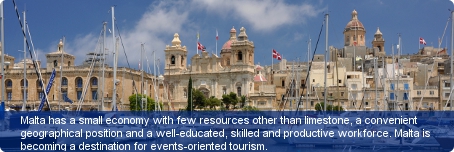Find a business in Malta

The Republic of Malta is an archipelago of six islands and islets in the Mediterranean Sea that has recently diversified away from its traditional shipbuilding industries, into financial and business services. Its economy is dominated by the services sector – it contributes 79% of GDP (2010). It has a GNI per capita of US$19,760 (2012) and has seen GDP growth of 1.4% per annum (2008-12). As a relatively small economy, Malta is vulnerable to fluctuating international economic conditions as seen by its stagnation during the global downturn of 2008-09.
Malta has a small economy with few resources other than limestone, a convenient geographical position, some tourism and a well-educated, skilled, and productive workforce. In 2011 the direct contribution of travel and tourism to the economy of Malta was 14.5% of GDP, generating 25,000 jobs – 15.7% of total employment (World Travel and Tourism estimate). Tourist arrivals are mainly from the UK and Italy, although 25% more German tourists visited in 2011. During the first half of 2011 (January-June) almost 620,000 tourists arrived in the country, an increase of 12% from the year before. The Maltese tourist sector remained fairly stable despite the financial crisis in 2008 that seriously affected the global tourist industry. The exception to this was the hotel and restaurant sector, which lost 10% of its GDP over 2009 to 2010.
The manufacturing industry in Malta contributed around €625 million (just over 13% of GDP) and employed 15% of the workforce in 2009. Products manufactured in Malta include textiles, chemicals, and consumer goods, such as cosmetics, food and beverages, and electrical equipment. Electrical and optical equipment is one of the largest sub-sectors, which contributed €140 million to GDP in 2010.
The Maltese government has introduced policies to attract investment for this industry, such as a tax holiday of ten years for new export-oriented companies and duty free importation of plant machinery. Despite these measures, manufacturing contracted 19% in 2009 from 2008 partly because of the global economic downturn.
Various oil fields have been identified in and around Maltese territory, particularly in the Mediterranean Sea close to the Libyan and Italian borders. This has led to many disputes, notably between Malta and Libya in 2008 over the Medina Bank that straddles their territories.
In the 1980s, a global recession led to the collapse of Malta’s shipbuilding industry. The country underwent a major structural adjustment to its economy in the 1990s when the public sector was reduced and state-owned enterprises were privatised. A long period of good, steady growth came to an end in 2001, as export demand fell and the economy stalled during 2001-05. After four years of stagnation, growth resumed at 2.4% in 2005. The country joined the European Union in 2004 and adopted the euro currency in January 2008.
Malta’s financial services industry has grown in recent years and in 2008-09 it escaped significant damage from the international financial crisis, largely because the sector is centred on the indigenous real estate market and is not highly leveraged and the banking system is closely regulated.
Malta has a 92.4% (2005) literacy rate and the vast majority of the country’s inhabitants speak English as their first or second language. Both Maltese and English are official languages in Malta. The majority of the Maltese workforce is employed in service-oriented jobs. According to a labour force survey taken in 2011, 15% of Maltese workers are classified as professionals and 8% are in managerial roles. In 2011 the rate of unemployment was around 6%.



